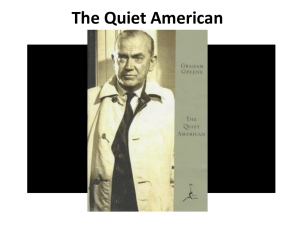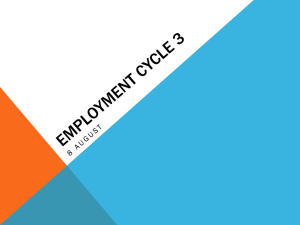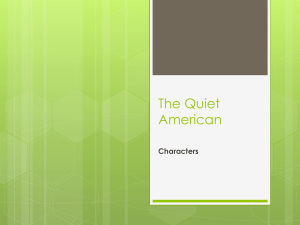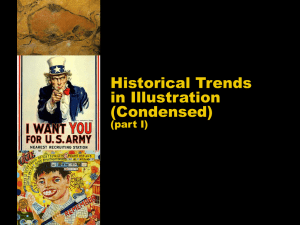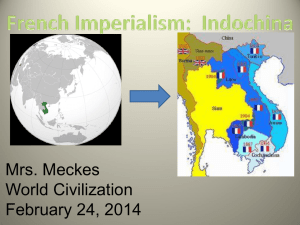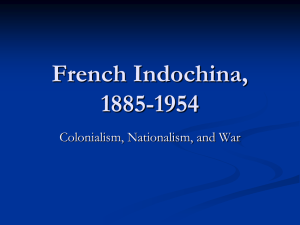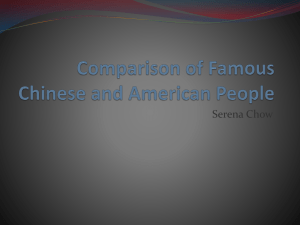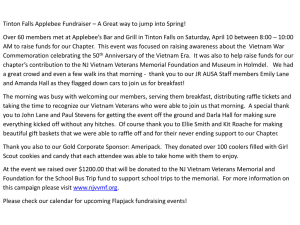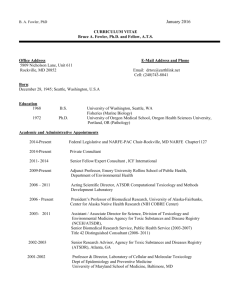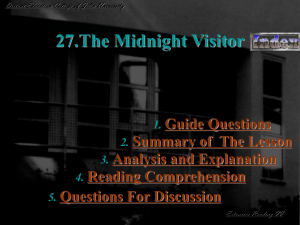The Quiet American intro - English-Units 3 & 4-BCH
advertisement
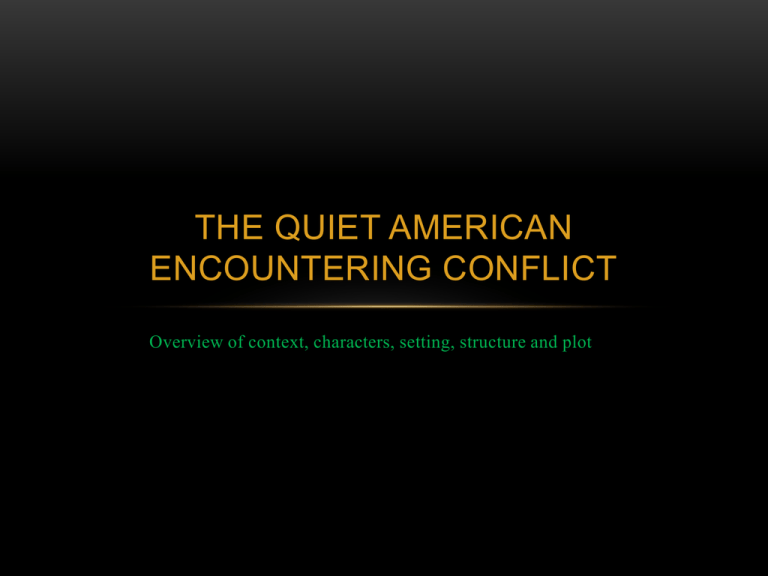
THE QUIET AMERICAN ENCOUNTERING CONFLICT Overview of context, characters, setting, structure and plot OVERVIEW • Set in Saigon, 1950s during the French Indochina War. • It is told from the perspective of the English journalist Thomas Fowler. • The story is about betraying principles and getting involved. • In the novel Greene explores the shades of grey that occur in conflict. • Exploring the fact no one is completely innocent of inflicting harm upon another. Greene uses Fowler to explore the idea that it is the innocent who are most capable of hurting others due to their ignorance. Psychology of moral dilemma. • In the end Greene concludes that people must take responsibility for their action or inaction – neither is right, they are both choices which result in hurt and death. • Juxtaposed ideas – non-involvement v’s action. Neutrality v’s commitment. CONTEXT – FRENCH INDOCHINA WAR • Prior to WW2, Laos, Cambodia and Vietnam (Indochina) were colonies of France. During the war they were overtaken by Japan, and then at the end of the war France regained governance. • The French Indochina War was fought between Laos, Cambodia and Vietnam for their independence from France. Began 1946 and ended August 1954. • A Quiet America is set immediately before the Vietnam War. CONTEXT – VIET MINH • They were a coalition formed in 1941 to fight for Vietnamese independence. Their leader was Ho Chi Minh. They were communist. • The French Indochina War was fought between the Viet Minh and the French. • Vietnam War: French Indochina War was overtaken by the Vietnam War which began in 1955 and ended in 1975. FOCUS QUESTIONS • After reading the novel what is your impression of Saigon? • In the Indochina War who are you more likely to sympathise with and why? • Can anyone remain an objective observer? CHARACTERS- THOMAS FOWLER • Fowler is symbolic of the old world – cynical and despairing believing people are corrupt it is human nature • Cynical narrator who has made a career out of being a bystander. • He has embraced non-involvement as a mode of existence. • Detaches himself from the events around him • Left his wife (Helen) in England after being unfaithful. Escapes to Vietnam • As an Englishman in the Indochina War he regarded as neutral. This is a symbol of how he regards himself. • He is having a relationship with Phuong, a young Vietnamese woman. He regards her as a possession. Phuong unable to speak English is divorced from Fowler’s life and work. • He is an atheist – this is part of his cynicism fundamental to his character. • His name is a symbol of his character – Thomas= doubting Thomas. • He believes the only absolute thing in life is death, he says he welcomes it however, like many of his other ideals he is afraid of it. • Fowlers detached and well-order existence is disturbed by Pyle. • Fowler is world-weary • The audience fail to sympathise with Fowler • Through Fowler the audience learn that inactivity is as despicable reaction to conflict as action. ALDEN PYLE • Symbolic of the new world – American, idealistic, naïve and clumsy • Complete opposite to the narrator – young and idealistic V’s Old and cynical. • Describes as having “schoolboy innocence” • Ironically his name Alden means old and wise. • Eager to get involved – war, Phuong but he insists on a need to “play fair”. • They both discuss Phuong’s future in her absence but it Phuong who ultimately decides. • Pyle has an idealised view of the world and is detached from reality. This idealism gets him caught up in plastic explosives (symbol of the plastic new world) but his is naïve and detonates the bomb in the market place. Surrounded by dead bodies he is only concerned with cleaning the blood off his shoes. • Pyle believes he is clean, innocent of his own actions and for that reason Fowler decides Pyle is too innocent and naïve to live. PHUONG • Symbol for Asia beautiful and in danger with the capacity to rise. • Centre of the love triangle • Objectified by Pyle and Fowler. Pyle sees her as childlike and unable to make her own decisions. Fowler sees her much more realistically. • For Fowler she is an escape – she prepares his opium pipes so he can escape reality. Her skins is even the colour of opium resin – amber. • She cannot speak English • Her name means Phoenixmythical bird. She is the only one who does rise from the wreckage of the world around them. • She is not destroyed by those around her. • See lives day to day, refuses to be a victim. MINOR CHARACTERS • Miss Hei: Phuong’s sister, interested in material comfort. Speaks and reads English, uses her talents to make a living. She too refuses to be a victim. • Vigot: French detective. Portrayed as a sensitive man, well learnt. Not sorry Pyle is dead. He knows the purpose of life and for him it is to find the truth. Greene uses Vigot to represent truth in contrast to Fowler who struggles with the concept of truth. • Mr Heng: Responsible for the death of Pyle. He believes that it is impossible to be a bystander in conflict if one is to remain human. To survive Heng supports Mr Chou ‘like rats’. Fowler is cynical is Heng and his associations with these rat like animals but it is in fact Fowler who is like an animal not Heng. • Captain Trouin: Pilot who drops napalm on villages. He is dismissive of Fowler’s detachment from the war, Trouin knows the war can not be won, but he is a professional soldier. Takes Fowler to a prostitute but Fowler is impotent, in contrast to Trouin. STRUCTURE • Constructed in four parts written in a circular narrative. • Part 1 – directs the audience to the relationship between Pyle and Fowler. Pyle declares his love for Phuong and the complication is established. • Part 2 – Explores the complication between Pyle, Fowler and Phuong. Phuong leaves with Pyle. Fowler is affected by the war around him, he cannot maintain his cynical detachment. Afraid of death and becomes involved with the living. • Part 3 – Climax, Phuong has left Fowler, Fowler confronts Pyle. Heng shows Fowler the destruction Pyle is creating with his “plastic”. Ends with the carnage in the marketplace. Pyle cannot comprehend that it is his ignorance which is responsible. • Part 4 – Resolution, Makes a pact with Mr Heng who has killed Pyle. Phuong moves back with Fowler, It seems as though everything is back to the beginning “It’s like it used to be,” I lied “a year ago.” Except now Fowler is even more unsure of his motives. SETTING • Saigon which appear to be separate from the war – consumed by social activity – western – drinking and dancing. • Dancing is a symbol for the thin veneer of civilisation and of façade. Pyle and Fowler are bad dancers (symbol). • When in the country Fowler contrasts the horror of war with the softness and natural beauty of the landscape. • In the countryside Fowler describes the dead bodies in the river like ‘meat’. When in the city and confronted by the same thing he feels he has to act. CONFLICTS IN THE TEXT • Both implicit and explicit. On a societal and personal level. • Personal • Interpersonal • Political • Economic • Cultural • Ideologies • Romantic
